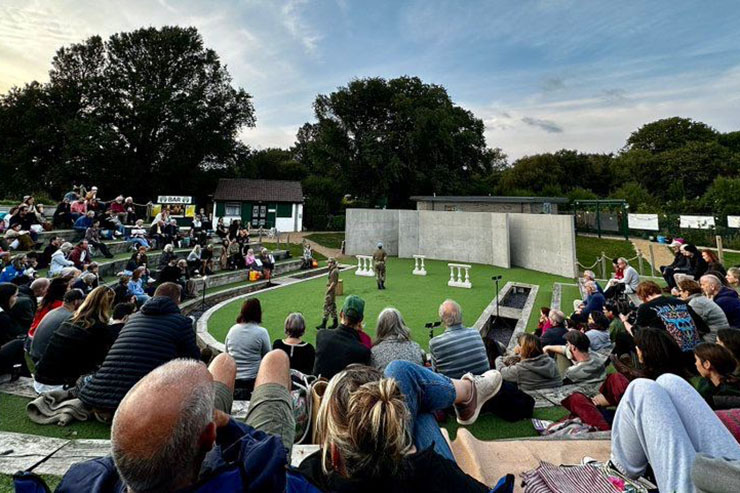Do you like Shakespeare? Some folks do. Some folks don’t. But there’s no doubt that across his range of plays he picks up on nearly every facet of the human condition: conflict, ambition, comedy, despair, death, love, power, politics, tribalism, war and xenophobia.
On the other hand, some of his plays – such as Much Ado – may at first sight seem pretty light and frivolous. But that would be to misjudge the Bard. There are some surprisingly modern themes in this tale of deception, treachery and scandal which takes places among a classy group of lads. They’re hanging out in the pretty Italian town of Messina during the Renaissance. Pretty soon we realise that we’re entangled in a whirl of five actors disguising themselves – and their rampant desires – behind a masque of different roles.
It’s hard to know who to trust. Yes, the characters swap allegiances and roles, change costumes, and disguise or enact their desires. It’s definitely complex. On the other hand, it can seem at times to be almost playful and juvenile. The pursuit of sex and desire are sought, then lightly brushed aside. Consequences are not considered. Betrayal and falsehood are part of the game. Crossdressing. Mistaken identity. The masquerade ball. Well, who is who?
Nevertheless, this is a short but surprisingly intricate play. Indeed, Much Ado raises laughter and sorrow with the famous early lines: “How much better to weep at joy than to joy at weeping!”
The audience might ask, unpicking the cast, whether the characters are toying with each other? Hero (Leonardo’s daughter) and Sheriff (Hannah Johnson) are, with Claudio and Little John (both played by Andy Colter), the young flighty lovers.
Meanwhile, Benedict and Beatrice (Ryan Woodcock and Lydia McNulty) – depicted as wise steadfast folk – are flirting together with some degree of wit. “Lady Beatrice, have you wept all this while?” he asks. “Yes,” says Bea in a tired voice, “and I will weep a while longer.” We see the shadow of an old familiar love and affection amid a field of mirrors. But should she, an orphan, really get involved in the seductive dance of the masquerade ball?
Don Pedro, the Prince of Aragon (Ethan Taylor), is just back from the wars with his triumphant army. Leonato (governor of Messina) is all chirpy about these battlefield successes whereby “a victory is twice itself when the achiever brings home full numbers.” His older brother, Antonio, is the wise type offering help and advice. He keeps an eye on his niece, Beatrice (who he reckons has a sharp tongue).
Yet, if anyone has a quiet and complex understanding of relationships – not to mention skills in setting up the entertainment of the masked ball – surely that is Leonato. He’s also pretty generous to his daughter, Hero (Hannah Johnson), and her plans for marriage.
Meanwhile, Don Pedro is keen to strut around with his own bit of seduction – albeit in disguise. His bastard brother, Don John, has a couple of playful sidekicks including a meet-up with the regular drunkards Borachio and Conrad.
At times, with costume changes, it could be hard to follow who was who. But ‘comedy and complexity’ might offer a snappy summary for a play that could almost be farce, yet balances a wild mix of relations and intrigues of the most unlikely kind.
This production at the Brighton Open Air Theatre (BOAT) perfectly sets the Shakespearean scene. A sparse stage, open to the sky, with the audience seated in a raked semi-circular forum. This wasn’t Messina but, under a summer sky, BOAT is still the most fabulous of venues as the sun sinks over the sea. There was a 150-strong audience and, yes, it did rain briefly towards the end of the performance. But no one left early!
Sarah Slator directed and adapted the play, with Chloe Bond and Michael Slator handling set construction and Simon Stallard providing music. Once again This Is My Theatre (TIMT) have shown they can create superb and dynamic outdoor productions with a small cast, minimum props and a big idea.

